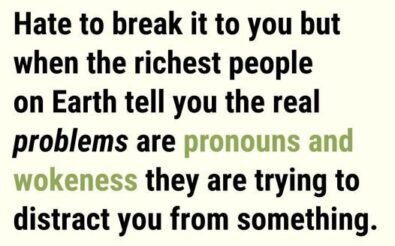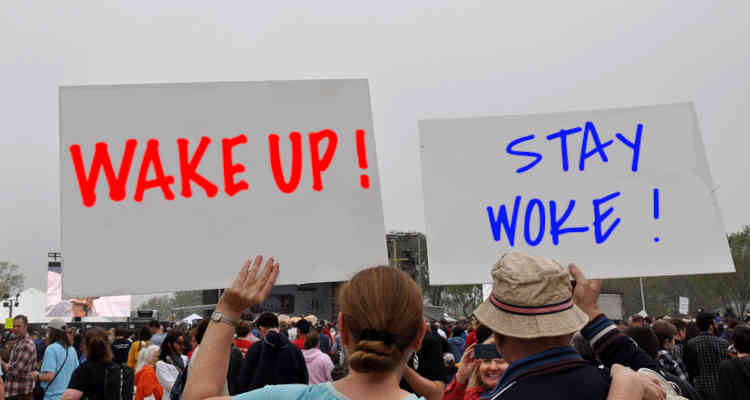Well the Barbie movie is out, with much fanfare. Most people seem to love it and think it’s fun. But a few are calling it feminist and “woke”.
It’s not the only thing that is being criticised as “woke” these days. Political correctness is woke. Black Lives Matter is woke. Feminism is woke.
These are all negative uses of the word. But originally (and still with many people) it had a positive connotation.
So should Christians be woke or anti-woke? Is God woke?
A little etymology
The idea of being “woke” seems to have originated with black American folk songer Leadbelly, who advised some black teenagers falsely accused of rape to “stay woke, keep their eyes open.”
Over the next decades the word gained other meanings and nuances.
- ‘well-informed’ or ‘aware’,
- black Americans gaining greater self awareness,
- “alert to social or racial discrimination and injustice”,
- “a progressive outlook on a host of issues as well as on race”,
- in the Black Lives Matter Movement, “woke” included the meaning “awareness of police abuses”.
Thus “woke” gradually acquired a more specifically leftist or social justice meaning, especially in reaction to former president Donald Trump and his right wing supporters. And so to be “woke” could mean believing that the US was becoming anti-democratic, to be opposed to racism, sexism and white privilege, and to support minorities seen as being oppressed – blacks, the LGBTQI community, the poor, immigrants, etc.
Conservative and right wing politicians and media reacted to all this and turned the word into a pejorative sense. To be “woke” to them was to be anti-American, anti-capitalism, anti-conventional morality, anti-family and to support cancel culture and Marxism. Thus conservatives have opposed teaching on race, feminism, sexism and gender identity in schools and even universities, because these things are “woke”.
So is God woke?
Where does God stand on issues of race, inequality, gender and oppression?
The God of Christianity’s views can be found in the Bible, although sometimes we need to understand the context before we apply the teachings. Here are some Biblical teachings on these matters:
Jubilee
In the Old Testament, every 50th year was to be Jubilee. In the laws for this time, God showed he cared enough for the poor to ensure they didn’t become homeless and landless. Levitus 25:25-28:
“If one of your fellow Israelites becomes poor and sells some of their property ….. what was sold will remain in the possession of the buyer until the Year of Jubilee. It will be returned in the Jubilee, and they can then go back to their property.”
Caring for the poor
Another example of God caring for the poor and ensuring that they weren’t exploited. Levitus 25: 35-36:
“If any of your fellow Israelites become poor and are unable to support themselves among you, help them as you would a foreigner and stranger, so they can continue to live among you. Do not take interest or any profit from them ….”
Stopping long term indebtedness
The poor can easily get into cycles of indebtedness that they cannot escape from, but the Old Testament law aimed to stop this and allow the poor an opportunity to rebuild their lives. Deuteronomy 15:1-2:
“At the end of every seven years you must cancel debts. This is how it is to be done: Every creditor shall cancel any loan they have made to a fellow Israelite. They shall not require payment from anyone among their own people, because the Lord’s time for canceling debts has been proclaimed.”
Foreigners & refugees
People can easily be xenophobic and fearful of strangers, and unwilling to share their nations’ resources with those who enter their land looking for a new life. Exodus 22:21 & Deuteronomy 10:19:
“Do not mistreat an alien or oppress him, for you were aliens in Egypt.”
“Therefore love the foreigner”
Advocacy
The prophets emphasised that behind these rules were principles of justice that God wanted us to be committed to. Isaiah 1:17:
“Learn to do right; seek justice.
Defend the oppressed.
Take up the cause of the fatherless;
plead the case of the widow.”
We can see that God is portrayed in the Old Testament as having an heart and a strong commitment to justice for the poor, the oppressed, the widowed and the alien living in Israel.
The same values in the New Testament
Not all Old Testament laws apply to non-Jews today, but Jesus and the apostles upheld this emphasis on justice and mercy.
In a parable (Matthew 25:31-46) Jesus commends those who care for the hungry, strangers, the sick and the imprisoned, and said:
“Truly I tell you, whatever you did for one of the least of these brothers and sisters of mine, you did for me.”
Jesus condemned the religious people who were meticulous in their religious observance but negelected justice. Matthew 23:23:
“Woe to you, teachers of the law and Pharisees, you hypocrites! …. you have neglected the more important matters of the law—justice, mercy and faithfulness.”
And Jesus’ brother, James, said our care for those in need was an essential part of our faith. James 2:14-17:
“What good is it, my brothers and sisters, if someone claims to have faith but has no deeds? Can such faith save them? Suppose a brother or a sister is without clothes and daily food. If one of you says to them, “Go in peace; keep warm and well fed,” but does nothing about their physical needs, what good is it? In the same way, faith by itself, if it is not accompanied by action, is dead.”
It’s easiest to ignore ….
These teachings can shock us. Is God a socialist?
We Christians in rich countries find it easier to ignore these teachings than to obey them. We have sophisticated ways to explain the passages away.

Dismissing a person who cares for racial or economic injustice as “woke” is a more extreme way of doing this. Too many Christians choose to follow ideologies that allow and encourage this. Even the imperative to offer faith and hope to others is sometimes used to negate these sayings, by calling them the “social gospel”.
Of course it is difficult if not impossible in our modern societies to live exactly as was commanded in the Old Testament, which was a very different culture, time and place. But no-one who calls themselves a follower of Jesus can totally ignore these strong teachings.
So is God woke?
It seems he is, at least according to the most common use of the word. It seems he really does care for the poor, the refugee, the person of a different race, the women (especially widows). It seems he really expects us to put care of others before personal gain.
It seems God expects us to be woke!
Photo: Jennifer Boyer on Flickr.





No doubt we should look after people less fortunate than ourselves, especially those who have reduced capacity to look after themselves.
However if someone is able bodied and able minded, I don’t believe they deserve special consideration because of factors like race, religion, gender or sexual preference.
There seems to be a lot of people thinking that they should be given special treatment in jobs or funding because they belong to some minority group rather than on the merits of their application.
It’s a tricky question, isn’t it? If we’re thinking job applications, then any employer wants the best employee they can get. But if disadvantaged people haven’t had the opportunity (e.g. educaton) to become competent, they remain a drain on society and welfare. So somehow we have to try to change something.
But I was thinking more broadly than job applications. Take black Americans as an example. Their ancestors were forcibly taken from their homeland and brutally forced to work as slaves. When they finally gained their freedom, they were severely discriminated against, in personal ways and in structural ways. They didn’t get the same opportunities (speaking generally) as white people. Surely they deserve some recompense, some special treatmant to make up for that history?
I think it is similar with First Nations people in Australia. They were often treated as non-human or inferior savages, taken from their land, not paid fair wages, etc. It is no wonder some of them have lost motivation, feel angry, etc. Somehow we need to undo the effects of what we colonisers have done rather than blame them. (Sure some will merit blame, but I’m speaking generally.)
So yes, it isn’t easy to find the just course of action, and we don’t want to penalise white people, but I feel the starting point has to be wanting to act as Jesus would act rather than as a conqueror would act.
Just a few rough figures…
The US House of Representatives has 435 seats of which 115 were held by African Americans.
That’s 26% of House seats. According to Wikipedia, (https://en.wikipedia.org/wiki/Race_and_ethnicity_in_the_United_States) 12% of Americans identify as African American.
Of course, The US has had a black President and currently has a black Vice President, and there are many African Americans in high office in the US.
In Australia we have 11 indigenous Members and Senators (4.5% of Parliamentary seats) where about 3.5% of the population is indigenous.
So opportunities are there if people want to make an effort.
I also think that [some] people use past events as an excuse for bad behaviour then wonder why a lot of their “tribe” end up in jail. I don’t say our justice system is perfect, but the degree of indigenous incarceration seems to be so out of proportion that you can’t say it’s all due to biased juries or judges.
If Australia needs an indigenous Voice then I think it needs to speak to their own people first and tell them that family violence is wrong and deserves to be punished. I don’t think that sort of behaviour can be blamed on events 200 years ago, it seems more ingrained.
I’m interested to hear your views.
Hi, good questions and thoughts. I think they deserve more than a quick response. So give me a few days and I’ll write a full post on them. Thanks.
I’ve had a go at answering your questions in my new post – First Nations: how did we get to here?. So just 2 comments here.
1. I checked about indigneous numbers in parliament, and got different figures to the ones you quoted.
• Total in parliament = 6 out of 227 = 2.6% (Reps: 2 out of 151, Senate: 4 out of 76).
• Percentage in population = 3.8%.
So under-represented, not over. Of course that doesn’t negate your general point that not all indigenous people are disadvantaged, which I agree with. But overall, there is still significant disadvantage.
2. I think it is generally established that indigenous people have suffered directly as a result of European colonisation, and this suffering and discrimination have continued to this day. The Voice is an attempt to give them voice, not necessarily money, in the hope that a fair settlement of the trauma can be reached.
It seems we have different sources about indigenous MP’s and Senators.
Here is mine.
https://www.abc.net.au/news/2023-05-01/first-nations-mps-senators-on-voice-to-parliament/101976080
I knew you wouldn’t have just made it up, and the ABC is a pretty reliable source. I used the official parliamentary website because I thought it was most authoritative. But it seems it hasn’t been kept up-to-date – those figures turn out to be for 2021, and there must have been some changes in the last election. Sorry about that.
By the way, in answer to your original question, “Is God woke” ?
Galatations 3:8
“There is neither Jew nor Greek, there is neither slave nor free, there is no male and female, for you are all one in Christ Jesus.”
Which implies to me that race or gender , social status and whatever else are irrelevant and we should be treating everyone the same regardless of “group”.
I think this is a fundamental truth of Christianity and of ethics. But there are two ways of treating people the same – one gives everyone the same thing regardless of need and the other gives everyone enough to bring them to the same level, as in this cartoon.
That’s a poignant cartoon but it’s essentially irrelevant imo. We would be doing the same for the chap on the right if he was white, Hispanic, African or Asian wouldn’t we ? In other words , needs matter not groups.
On the more general topic of ‘wokeness’ it seems to be getting more toxic by the day, eg the confected fury over the ‘Spanish kiss’ which most reasonable people would agree was an act of joy in an atmosphere of high emotion and yet the ‘perpetrator’ is being displayed as some sort of demon not deserving of his job. It’s completely trivial imo and yet it dominates the media (at least the ABC) as a moment of importance . In other words I think it’s a beat up by the feminists.
What do you think ?
I think we see this differently, as we might expect !
I agree totally. But (1) all Aboriginal nations have been deprived of their land and discriminated against, so some recognition and response to that is necessary for them as a group. The Voice is a step towards that. But (2) when it comes to actions to address closing the gap, they shouldn’t and won’t all receive benefits, just according to need.
I think if this was the only time a woman had been mistreated by a man, then it would be less important. But it’s not. Women have been experiencing all sorts of sexual attention for so long – afraid to walk home from work in the dark, abuse by priests and sporting coaches and teachers and family members, sly touching and rubbing on crowded trains, innuendo at work, etc, etc. They have increasingly been fighting against this attention. I don’t necessarily think everything they say and react to is right, but I find it hard to think anyone could disagree that women have too often been patronised, restricted, abused, etc. So this guy really should have known that and been more careful. If you are a man with some authority over a woman, that should be clearly imprinted in your behaviour. Of course people make mistakes, but he didn’t deal with it well. A quick and genuine apology may have got him off the hook, but he tried to push her to say it was consensual. I think he deserves what he’s getting, and hopefully he and others will learn a lesson. It seems some western men are slow to learn!
“ It seems some western men are slow to learn!”
I’m just wondering why you decided to single out western men, and could you say who they are supposed to learn from ?
I only really know western (i.e. Aust, NZ, UK & USA) culture. But also, we have possibly had more opportuity and time to learn these lessons.
I think it is clear that capitalistic, individualistic western culture is controlled by the powerful and isn’t kind to minorities (as a very broad generalistion). Therefore I think those of us who are in the more privileged position (which definitely includes me, since I am white, male, middle class, Anglo, straight, etc, though not rich or powerful) “should” try to understand our privilege and be willing to let some of it go or the sake of reducing inequality. If we have eyes, we should know this. But we also have plenty of opportunity to learn if we are willing to listen to minorities, including women (not a minority in numbers but in power).
Well, Western culture certainly isn’t perfect but neither are some others. Islam for example, we know how they treat women.
But it’s not WHO says something that is important it is WHAT they say.
We should be prepared to listen to anyone who has a valid argument based on fact and evidence not mysticism or prejudice (positive or negative) and not be afraid to call out rubbish when we hear it.
For sure. But I wasn’t suggesting western culture was worse, only that I thought we should know better.
I’m unsure what you are concerned about here. Of course I agree with what you have said, but I don’t think the often poor treatment of women and minorities by the proverbial rich white men with power is prejudice. I guess some people would say I’m too soft-hearted, but as a broad principle, I feel if someone says they have been hurt in some way, I’m generally prepared to believe them and to sympathise. Did you want to say a bit more about what you say here?
Just clarifying my last post, “calling out rubbish” was a general comment that doesn’t refer to anything you have said, which is always well presented and valid.
I hope you didn’t read that the wrong way.
Thanks for clarification, but I didn’t interpret it that way. I thought you were most likely referring to arguments for either feminism or closing the gap, but I wasn’t sure.
Feminism is fine up to a point. From the media I watch (usually the ABC) they are always going on about how the proportion of females in certain occupations is low compared to men and they think this is undesirable for some reason. Well, that could be due to 2 factors,
a) there is some sort of discrimination against females, which is a bad situation and should be fixed as long as women are able to do an equivalent job or
b) women and girls are just not as interested in those occupations as men, in which case this is a natural situation and there is no point complaining about it.
So I think that we need to decide first which of these is the issue before people start making a fuss over the raw data and demand “equal” rights for the sake of it.
Closing the gap is important and we need all ideas put forward to do that.
My main problem with “The Voice” embedded in the Constitution is that if it goes the same way as ATSIC and doesn’t work then we are stuck with an expensive white elephant forever. And if it does work and solves all the problems then why do we need it ?
So I am quite happy to
a) have a statement in the Constitution that aboriginal people were here first, which is just a statement of fact and
b) have an indigenous representative body whose existence depends on the results it gets in closing the gap and doesn’t just become a platform for radicals who want to change laws and customs to suit themselves.
Does that sound fair ?
Hello again,
I think that is fair enough. But I also think it is quite clear that many women at work have been discriminated against, treated badly by men, subject to innuendo and suggestion over and over again, etc. It’s not all women and it’s not all men – but ABS says 23% of women and 8% of men are victims of sexual violence, while 53% of women and 25% of men experience sexual harassment (harassment includes inappropriate comments, unwanted touching and lots more). So they certainly have a legitimate issue there. I don’t know about discrimination in winning jobs.
I think it is fair to say that women have had to fight for greater equality and greater protection, so I hardly blame them if sometimes they are too strong in their advocacy.
I don’t think so. It could be taken out of the constitution, and even if not, it doesn’t have to be expensive. But I think you are being too harsh. Half the reason for the Voice is symbolic or notional – instead of the same white races who took their land, destroyed their culture and ran their lives for two centuries also making decisions on their behalf, they get to make their own decisions and get a little of their sovereignty and dignity back. That is very important to them. So even if it doesn’t work (and how well do our parliaments, public services, etc, work?), it is their Voice and they have that recognition.
My very limited experience of Aboriginal people is that they tend to be very deferential, only a few are radical. The Voice is a recommendation that arose out of wide consultation and is supported by over 80% of indigenous people. If the Voice is set up to be representative and to consult widely, I don’t see how radicals are going to get control. I’d say it is more likely that our major parties could fall victim to radicals since they don’t consult much and are often controlled by vested interests.
Other countries have treaties or indigenous advisory bodies. Norway, Canada and NZ apparently have “stronger” bodies than is proposed here. South Africa, Germany, and Singapore also have indigenous or minority advisory bodies. So it seems to work OK for all them. I think a lot of what is being said is scare tactics by white people.
So I don’t think your proposal answers the deep desires of Aboriginal people for dignity, respect, autonomy and recognition of the truth of the past. The Voice is what they asked for. We’ve taken so much, why not give them a little that they have asked for?
Thanks unkleE, another well presented argument, we shall just have to disagree on the Voice.
A lot has been given back to aboriginal people. As I said , they own 40% of Australia’s land mass, compensation has been paid for stolen generations, and spending on aboriginal projects has been continuously rising with no discernable effect. They also have representatives in Parliament (including the Minister) as we discussed.
I think there needs to be an inquiry into where the money has gone and how it’s been spent before we repeat the mistakes of the past. Maybe the Voice will tell us where the money has gone.
In addition to that, it seems that every time a proposal is put up for an infrastructure project that will benefit everyone, like a low level nuclear waste dump or a hydro power project in Lithgow, an aboriginal group pops up and says “can’t do that it’s a sacred site”. So the proposal gets stalled in court and nothing gets done. We live in a modern country with 22 million people to look after and sometimes the majority must come first.
As to feminism, the rates of violence towards women all over the country (far worse in aboriginal communities) is a disgrace and needs to be addressed. This is the real issue, not petty things like kisses in my opinion.
By the way, if you think I’m a Right Wing nut job, I’ve voted Labor/Green/Independent all my life and I don’t even think about voting for Pauline.
Anyway, it’s been a good discussion, I respect your opinion, but if you think my comments are anti Christian or not appropriate for this blog I will cancel myself. 🙂
All the best.
It has been good to discuss. We wouldn’t expect to always agree.
Again, not sure who’s right, but Productivity Commission says 16% owned or controlled. The 40% number appearts to be where they have “rights and interests'”, which isn’t the same.
I think this is a real issue that needs to be worked out strategically. There will have to be some compromises. But there are surely some cases where we need to protect their heritage. I think it is also fair to say every time a proposal is put up for an infrastructure project that will benefit everyone, like a low level nuclear waste dump or a hydro power project, a local resident action group pops up and says “can’t do that it’s our backyard”! The first nations people aren’t alone!!
Yes, but (1) one thing can lead to another, by forming wrong attitudes, and (2) no-one should be coerced at all, big or small.
I certainly have never thought that, and I hope I’ve not given the impression that I did.
And I certainly don’t think your comments are unsuitable. I appreciate what you say and enjoy discussing with you. I am not so delicate that I can’t handle alternative viewpoints. You are very welcome.
Just to add, of course 16% is still a large area, but it does depend on where it is. I’m guessing it’s in areas where no-one else wanted it.
https://www.agriculture.gov.au/abares/forestsaustralia/forest-data-maps-and-tools/spatial-data/indigenous-land-and-forest#:~:text=The%20Australia%27s%20Indigenous%20land%20and%20forest%20estate%20%282020%29,to%20other%20special%20rights%20for%20Indigenous%20people%20
The Australia’s Indigenous land and forest estate (2020) dataset shows that a total of:
134 million hectares of land in Australia (17%) is Indigenous owned of this, 22 million hectares is forest
174 million hectares of land in Australia (22%) is under some form of Indigenous management, comprising 141 million hectares Indigenous managed and 33 million hectares Indigenous co-managed …
337 million hectares of land in Australia (44%) is subject to other special rights for Indigenous people …
https://www.agriculture.gov.au/abares/forestsaustralia/forest-data-maps-and-tools/spatial-data/indigenous-land-and-forest
DAFF
https://www.agriculture.gov.au/abares/forestsaustralia/forest-data-maps-and-to…
Australia’s Indigenous land and forest estate (2020) – DAFF
So you were right about 16% owned (my turn to apologise).
44% of the land subject to “special rights” probably means they can object to development, so we are back to waste dumps !
There would be overlaps between these definitions, some land would fall into more than one category.
Thanks for that. It would be interesting to know where it all is. The ABARE maps suggest mosty inland as you’d expect.
Would like to share some strong disagreements.
1. Redistributing resources by ethnicity, sex, etc. now in an attempt to right wrongs committed 100’s of years ago punishes the great-great-grandchildren of today for the sins of their ancestors long ago, and benefits people who were not the actual victims of the objectionable actions. I get the impression you wouldn’t approve of such OT-style “justice.”
2. Because the ledger of rights/wrongs representing the past actions of one group vs another exists entirely in the imagination and not in reality, it can never be balanced, and attempts to do so will go on indefinitely, at least until the tension and bad feelings generated by the attempt facilitates your country’s defeat by a stronger and more confident external invader who doesn’t share your country’s hang-ups.
3. Telling a entire race of people that they need special accommodation in the present because of the way their ancestors were treated in the past infantilizes the entire race. Not coincidentally it places the member of the group doing the infantilizing in a position of psychological superiority and infused with moral self-righteousness.
4. Further, this is more of a statement than an argument, but dividing school-age children by race and laying all this baggage on them is abuse.
Hi Gordon, thanks for your comments. You are welcome to disagree – thanks for doing it politely.
The wrongs weren’t only committed 200 years ago, but within present memory, and sometimes even to the present day. This means that many First Nations people today are still disadvantaged in two ways: (1) continued discrimination (more subtle now, but still present), and (2) past disadvantage can often lead to less opportunity today (e.g. the rich get better educated, have better healthcare and have advantageous networks and connections).
I’m not sure what you are saying here. If you are saying that wrongs such as stolen land, stolen wages, stolen lives and stolen chidren didn’t actually happen, than I think the historical fact prove they DID happen. If you are saying that because they are in the past, they no longer exist then I think (1) the disadvantage still exists, and (2) we punish cold case crimes and remember (and even hold sacred) memories of events like ANZAC Day and Independence Day, showing that the past still matters. Have I understood you correctly here?
I don’t see this. (1) This country was invaded, there were frontier wars and the “war” was never settled. Most colonising nations have made treaties with the indigenous peoples, so I believe we should do the same. (2) We whites are not “telling” the indigenous people, our government ASKED them what they wanted, and they asked for “Voice, treaty and truth”. I think they deserve that, because it won’t infantilize them, but dignify them.
I’m not sure I understand this, I’m sorry. Can you explain further?
Thanks again. I’m happy to continue the discussion if you wish to.
Australian aboriginals are citizens of the country like anyone else and have the same rights as other citizens.
If schools are available for their kids, but their parents/guardians are too disinterested to make sure they go to school and instead let them run around unsupervised, maybe committing crimes then who is to blame for that?
There has to be mutual cooperation in order to achieve advances for indigenous people, just like the rest of society.
I am currently reading a book by a historian on the treatment of Aboriginal people in Queensland in the 20th century and it is nothing short of horrific. I don’t wish to treat your views with too harsh disagreement, but I think we must take into account:
1. Aboriginal people have a very different (family and tribal) culture to ours. We can’t treat the two the same in every way.
2. White people forcibly took their land and pushed them to the margins. Even in the 20th century, Aboriginal people (some younger than me) were denied wages, opportunities, equal treatment, etc. The result was a generation with premature deaths, poor health, low education and lack of recognition. Much of this was perpetrated, encouraged and forcibly enacted by the government.
3. People don’t live in a vacuum. It has been shown that addiction, family violence, criminality, lack of education, etc, is more prevalent in the children of parents who suffered from the same. So the children and grandchildren of horribly mistreated generations are still plagued by these evils today – not only by their own choice, but by hereditary, family upbringing and continued mistreatment.
4. Since generations of white coloniser profited from stolen land, stolen wages, virtual slavery, cheap labour, stolen money due to them, etc, I believe we have a moral obligation to try to undo the evil we (our governments, primarily) have done. Only when we have done that can we justifiably (in my view) start to treat them equally.
. People don’t live in a vacuum. It has been shown that addiction, family violence, criminality, lack of education, etc, is more prevalent in the children of parents who suffered from the same. So the children and grandchildren of horribly mistreated generations are still plagued by these evils today – not only by their own choice, but by hereditary, family upbringing and continued mistreatment.
Which seems to imply that in order to save the children we need to get them out of horribly disfunctional families and into some semblance of a normal and civilised life. But we know the political ramifications of more “stolen generations”, so it seems that the cycle is likely to continue.
I think that is an element of what started this problem. When taken from their families, at least in Queensland, their treatment was even worse that what they were supposed to be suffering before. And often their family conditions were (1) caused by white mistreatment and (2) exaggerated to move people away from where they weren’t wanted. We need a new, culturally aware, approach.
We need a new, culturally aware, approach.
I would be interested to know how you think “cultural awareness” should be implemented?
More aboriginals in the police ? That would certainly help but eventually they will be accused of “culture betrayal” or similar for joining the white man’s organisations.
Same with social workers or nurses, some people want to continue the divide.
That doesn’t mean it’s not worth trying, I just wouldn’t expect too much.
It’s a good question, and I don’t know the answer. That’s what the Voice was supposed to do, though I reckon it can be done without it.
I think the start is “truth telling”. At present lots of people (especially LNP MPs, right wing media, etc) deny that anything bad happened, say we can’t go back to change the past so let’s move forward, etc. But I feel that things will never be put right until people really know the facts and feel in their guts how bad some of it was.
There are two extremes in response to white invasion/colonisation – (1) Tough luck, we won, get used to it. (2) We were wrong, we’ll all go home and give the land back to them. Obviously #2 won’t and can’t happen, but until the brutal truth is recognised we’ll tend towards #1, while I think fairness requires that we move some distance towards #2 – maybe #1.2.
So I feel a solution should give them back some land (more symbolic than anything else) and respect, somehow change the present living circumstances of marginalised Aboriginal people, work towards improving education and health in a controlled way (controlled by responsible elders) and give more decision-making over to elders, and does all this with an injection of funds that recognises the horrors of the past. That is the bare bones. But it has to not end up entrenching a victim mentality, but being empowqering.
A major issue is to find what Aboriginal people want. Granted they can’t get viable properties in every one of the 600 nations, what would work for them? Do they want to live in white society which is already diverse and multi-ethnic, retaining some semblance of culture? Do they want to try to go back to more traditional living (which I think is impossible, but the question needs to be asked)? Is there some compromise between these two? Obviously there’ll be different opinions. But this information needs to be known to form the basis of a strategy to redress the effects of old wrongs.
Tall order! But I still think it has to start with us whites accepting the ethics of giving back for what we have caused in the past. But I’m white and I don’t really know and it really isn’t up to me.
So sorry, a lot of words and only very vague answers.